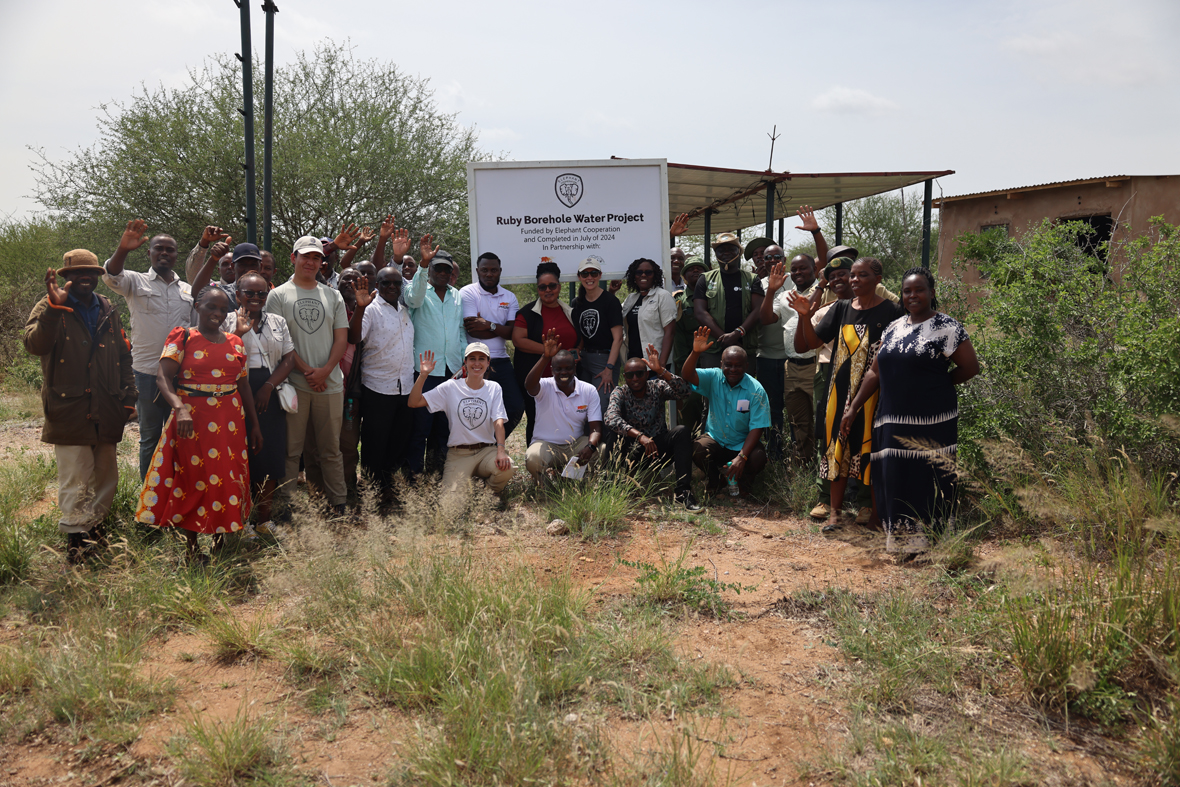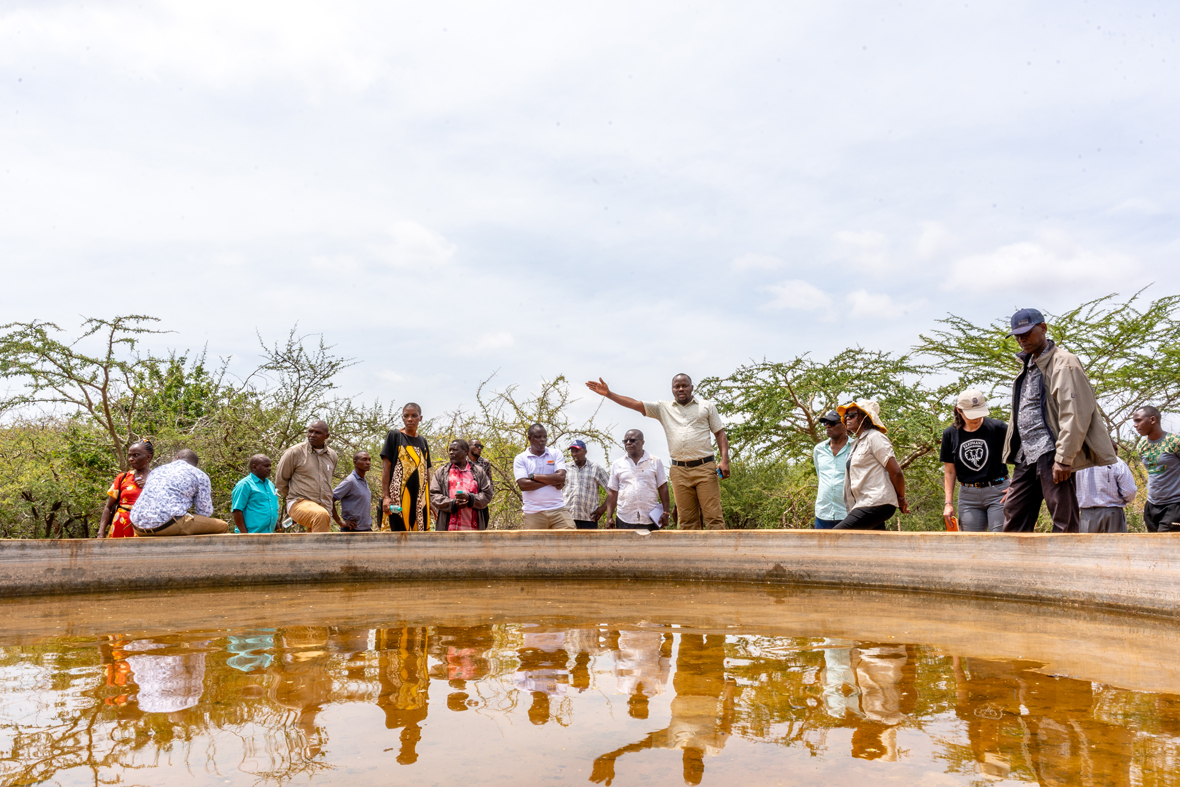AWF & Elephant Cooperation Partner to Provide Water for Climate Resilience in Kenya

Official launch of the Twiga Borehole in Mgeno Conservancy by Elephant Corporation and African Wildlife Foundation
General Inquiries
Tel:+254 711 063 000
Ngong Road, Karen, P.O. Box 310
00502 Nairobi, Kenya
In a landmark collaboration, the African Wildlife Foundation (AWF) and Elephant Cooperation have successfully completed a vital initiative to counter the devastating impacts of severe drought in the Tsavo Conservation Area. This project, which involved drilling two new boreholes, one in Kasigau Conservancy and the other in Mgeno Conservancy, delivers essential water resources to support people, livestock, and wildlife in this semi-arid region.
Kenya experienced its worst drought in four decades in 2021 - 2022, resulting in catastrophic consequences for its wildlife. Between February and October 2022, the country lost 512 wildebeests, 381 common zebras, 205 elephants, 49 Grevy's zebras, and 51 buffaloes, among other species. The Tsavo Conservation Area, encompassing Tsavo East and West National Parks and surrounding conservancies/ranches, was particularly hard hit.
The drought exacerbated human-wildlife conflict in the Kasigau and Mgeno areas. In desperate search of water, elephants caused significant property damage by targeting houses, stores, and water infrastructure. This project aimed to mitigate these conflicts by providing reliable water sources and reducing the need for wildlife to encroach on human settlements.
"Human-wildlife conflict is now the leading cause of elephant mortality, driven by expanding human populations encroaching on natural habitats," stated Elephant Cooperation. They further reiterated, "Our commitment to reducing these conflicts involves partnering with organizations to create community-led solutions through initiatives such as the recent borehole project with the African Wildlife Foundation, who work to protect elephants while benefiting local communities; thereby promoting peaceful coexistence between humans and wildlife."

The water pan where wildlife will be drinking water from the borehole
The borehole in Kasigau Conservancy supports three neighboring villages, allowing them to water their livestock at the site. This water source benefits an estimated 3,000 livestock heads (1,500 from the communities and 1,500 from the Ranch). To prevent localized vegetation damage, especially by elephants, cattle water troughs were built away from the water pan, with additional water troughs constructed specifically for elephants and other wildlife.
AWF’s Tsavo-Mkomazi Landscape Manager, Kenneth Kimitei, highlighted, “This project not only ensures reliable water sources for people, livestock, and wildlife but also fosters local stewardship of wildlife and their natural habitats.” Ultimately, it empowers communities to live in harmony with nature, promotes sustainable natural resource use, mitigates human-wildlife conflicts, and leverages economic growth through livestock production and tourism.
The borehole in Mgeno Conservancy supports livestock production and ecotourism, following the Conservancy's management plan. The ranch ensures water distribution to areas unsuitable for drilling, with the goal of providing a stable water source for each grazing block to support livestock and wildlife.
Both boreholes are powered by solar energy to promote sustainability and reduce costs. The conservancies fund their maintenance through proceeds from livestock production and ecotourism activities.
This initiative by the African Wildlife Foundation and Elephant Cooperation represents a crucial step towards mitigating the impact of climate change in the Tsavo Conservation Area, ensuring the survival and well-being of its people, livestock, and wildlife. By harnessing sustainable energy and promoting cooperative efforts between local communities and wildlife, this project sets a precedent for future conservation and resource management endeavors in Kenya and beyond.
About Elephant Cooperation
Elephant Cooperation is a unique non-profit organization. Based in San Clemente, California, founded by Scott Struthers in 2016. Our mission revolves around community-led conservation, where we actively collaborate with local organizations and communities in an effort to “Cooperate to Coexist.” Our distinctive approach emphasizes solutions that generate opportunities for individuals and communities, all while preserving the well-being of elephants, wildlife, and their habitats. By prioritizing solutions that nurture opportunities for communities, our initiatives not only safeguard wildlife and their habitats, but also acknowledge the inherent value they provide to both people and the environment. We believe that by joining forces and envisioning the future of Africa, we can create a more substantial impact, in the realm of conservation.
About African Wildlife Foundation
The African Wildlife Foundation is the primary advocate for protecting wildlife and their habitats as an essential part of a modern and prosperous Africa. Founded in 1961 during the African independence movement to build our capacity to steward our natural resources, AWF articulates a uniquely African vision. It bridges science, education, public policy, and field programs to demonstrate the benefits of conservation and build a future for Africa where people and wildlife thrive.